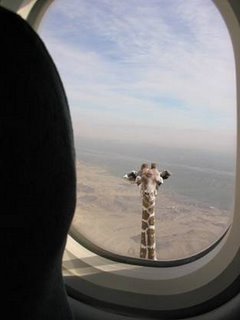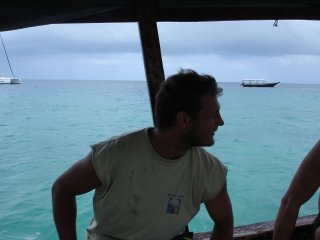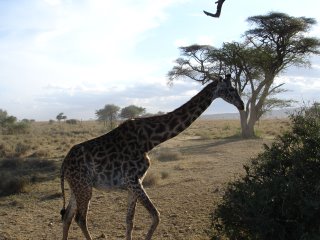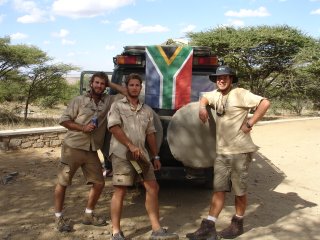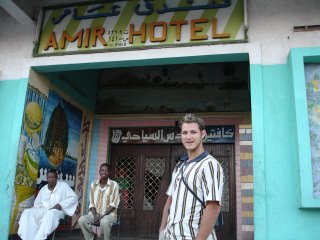The 62 day journey of 3 men, into Africa "I am reborn. This is my dawn. Real life has just begun..." Extract from Chris McCandless’s diary, who survived with bare necessities for about 100 days before dying alone in the Alaskan WildernessA man in Cairo calls out: “Hey cowboy, where’s your horse?” The harsh Egyptian sun bounces off our cowboy hats – made of the same stuff as veldskoene. We’ve come prepared. We have money belts and a 2m long cable to secure our bags. But ja, the Americans have been everywhere, and when local people see us, they double the prices. So it’s not easy for us to attempt a low budget lifestyle. We explain that we’re poor students. We don’t have any money. And in these negotiations, we meet the charming people of Africa, we talk to them and we get to see it all.
Once inside one of the three giant pyramids the flight and the hotel in Cairo is all a distant memory. This is another Africa. It is deep and rich, dry and ancient. It’s clear that a great Empire existed here, once upon a time, on a continent far far away from the one blasted by this 21st century sun.
The sun represents the great light of day, the immense power of reason; the moon the light provided for when reason is not enough – Sir Laurens van der Post in The Heart of the HunterWe’re wearing white Arabian cloth on our heads. The three of us ride camels between the silent, hulking pyramids. We approach the Sphinx. Our faces light up with wonderment. It’s one of the first of many moments in Africa. This parched place, with its papyrus and purple pillows, its robes and dancers, incense and camels, is a land of kings.
Our road takes us to the river. We swim in the Nile, washing Egypt’s dust from our hands and feet, while temples – like Philae - hover against the hills. Lidless statues stare at us from the shores of the Nile. The gods are beckoning, between the palms and plains behind us. Why do we travel? Do we need an external confirmation of our existence?
We leave against the flow of the Nile, moving beyond Luxor and Aswan, towards Wadi Halpha.
I wanted movement and not a calm course of existence – Leo TolstoyFrom the waters of the Nile, we move deeper into The Sudan. We’re filled with nervous excitement. On the ferry, the people around us wear white robes and skullcaps. Meanwhile, the setting becomes drier and harsher. Lotti – a Sudanese guy, who once worked in Cape Town at a Shell garage – helps us buy food for the same price the locals are paying. The sun sinks below the Nile and the bone-like hills glow eerily under the stars. At 5am a guy wakes up to pray on the steel deck of the ferry, and as he starts, the loudspeaker blares for the umpteenth time. Before my eyes close I’m dimly aware that no one has risen to join him.
Hours later we’re on the back of a truck, headed towards Khartoum. I’ve just hit my head against a bolt in the roof, and we’ve realized the desert is not going to be a smooth ride. There are concrete hard corrugations, holes and thick sand. These prevent us from sleeping. Neil, Bok and I decide to use the time to share secrets – some good ones! At 2am I see a light in the distance, and I think about the 6 tourists that were shot outside Khartoum. We stop suddenly for tea in the middle of the Nubian Desert. I get out and count stars. We quickly open a can of tuna and pass around pieces of bread.
At 2pm we get out and wash the desert off our hands and faces. It’s hard to believe that somewhere in this first mammoth journey, we whities were singled out – “You, you, you,” and told to get off the bus, at gunpoint. I look at Bok and Neil, and along the dry plains, the color of skeletal bones, behind us. The wild curtains of dust thrown high by the vehicles now lie still on the ground. We clamber on board once more, our legs squashed against blue, plastic barrels of water. The sands are thrown up again.
After 25 hours on a crammed bus, with virtually no sleep or food, and covered in dust, we get off. We have just begun to move down through Africa and it’s already feeling harder than we could ever have imagined. We check into the El Haramain Hotel in Khartoum. We sms our girlfriends, shower and then pass out, allowing the mosquitoes to drop down and feast.
I wake up with a very stiff back, and plenty of shooting pains. We speak a little about the cool Arabs we’ve already encountered. We walk to the White Nile Bridge, about 4km, and try to make out where exactly the White Nile meets the Blue. After a squabble, we decide to make a rule: No statements. If someone wants to say something they have to preface it with ‘I think’.
We’re somewhere else, waiting for hours until the bus is full, and, after a bunch of Sudanese have a fisticuff over seats, we get going. We leave Khartoum, a busy, friendly city full of helpful people. The driver of the bus to Al Gedaref doesn’t play games. He passes trucks and buses as though they’re standing still. We arrive in Al Gedaref at 5:30pm and can’t find a soul that speaks English. There’s no one to help us get to Al Gallabat, no way to get to the border. So we check in to the Akim Hotel.
We have planned our trip – where we are going, when we hope to be where. Our budget is fine-tuned. But on a daily basis we have no idea about what’s in store for us, or where we will sleep. In the Akim Hotel we find only one tap that works, and to shower a bucket has been provided. We drop our dusty bags, wipe our faces and arms, and then we go walkabout.
The dust flickered like fire around their feet – Sir Laurens van der Post, in The Heart of the HunterThe locals watch us with unabashed fascination. Do white people ever come here, I wonder.
And they love Mandela on our shirts.
Before going to bed we quickly speak about Ethiopia. A long and hard journey still lies ahead of us, that much is obvious.
We’re hoping to leave Sudan, heading towards Gondor, in Ethiopia, today. I enjoy the extra 15 minutes sleep while Bok and Neil wash up. We leave the minus 2 star hotel just before 8am. Our transport is a bakkie, with three guys in the front, and 12 of us in the back. The road shape shifts from tar to gravel and back, meanwhile the driver puts pedal to the metal. Is he possessed? After showing our passports, two more clamber on board, and at one point we are 17 sitting at the back. At Gallabad we go through Sudanese Customs and after crossing a bridge we walk into Meterna, in Ethiopia. The customs area there is a clearing under a tree, and the immigration section is a hut a little further on. We do the black market thing to break on through to the other side. As soon as we exit bone dry Sudan we find 4 guys sitting, drinking beer, two of them completely smashed. Now we’re in Ethiopia. We still need to get to Gondor. I chat to an old fella about South African history while we wait for the bus to fill up, that is, Africa’s version of full.
It feels like the sea. It’s restless and tiring tides. We load, we’re full, and then it’s the road and the ride…it fills and empties….
Ethiopia is green. It’s the most green we’ve seen since starting our journey.
We arrange transport for the remainder of the road to Gondor (not quite in Middle Earth, but almost) on an Isuzu. We travel in style, lying on bags of corn and taking in a stunning sunset. After dark we stay over in an Ethiopian dorp called Chicene. When we at last have our beds open, sleep hits us with its hammer.
It was a notorious axiom among the first people that animals defended themselves against hunters by inducing sleep in them. – Sir Laurens van der Post in The Heart of the HunterA wonderful sleep is over too soon. We sit for a long time in our sleeping bags while the great morning dawns around us. Then it’s another day eating dust, the Isuzu’s racing each other like the remnants of Paris to Dakar or something. In Gondor, with home still unthinkably far away, we decide to go bigger, and board a bus. Roll, roll, roll the bus, all the way through Ethiopia.
We decide at some point that we’re going to sit in front of the bus and enjoy the view. Sometimes there is only one good track on a wide belt of dirt. The law of the road then is that the biggest vehicle has right of way. Oncoming traffic often swerves out of the way at the last second. We glance at each other. It’s unnerving. We don’t sit in front again after that, if we can help it.
I speak to a tour guide called Wajje before we bail out and clamber onto a smaller bus. At Gauer Gaurge the next day, we’re drinking Dashen beers in a glorified Shebeen. Africa is changing in our hearts. Africa’s bad, Africa's hard, but in a good way. Africa is good for the soul. Africa is a place for a man to be man.
We avoid the chaos of the main cities. We prefer the rural settings, with its villages. In one we play table tennis with the locals, and when we leave a crowd of 30 is walking behind us.
And so it continues. Dust and road and sweeping landscapes. Faces fill the emptiness, the all-day droning of oil through engines that one day Africa will boil and stew and leave for dead, another steel skeleton glinting in the desert.
It’s Tuesday and we’re in Addis Abbaba. Bok and I go to exchange traveler’s cheques at the Commercial Bank of Ethiopia.
We eat vegetable omelets afterwards and slurp down cappuccinos. The latter is the same colour, but a lot sweeter and smoother than dust. Yum.
We walk from Meskel Square to Mexico Square. People stare less at us here than in the rural areas. We walk past a soccer stadium, and it’s buzzing. We see the Ethiopian soccer team – who beat Rwanada 2-0 – on the back of a truck. They hold the East African Cup aloft. The crowd goes mad.
I wake up and it’s Wednesday, almost halfway through December, and where are we now? It’s not yet 5am, and the guys are full of jokes. We find our ride, and hours later we arrive at the breathtaking sweep of Ethiopia’s Lake Shala. We sit for a long time and chill, soaking it all up. Then we stomp along a dusty track again. A minibus stops to pick us up. When they ask us to sit in front we know that now they are going to pack us in. And how right we are: 4 in front, 2 goats in the boot, 9 goats on the roof rack and 24 dudes in the back. True’s Bob.
At Dilu we get a single room with a double bed for a 2 pound coin. We chow down on roast lamb (precooked in foil), with some cauliflower, bread and Coke.
At Moyale we’re invited to attend a wedding, and from there we’re on a livestock truck. 800km, and more than 16 hours later, we arrive in Nairobi. Nairobi is one of the cities that impresses us the most, so far.
We wake up for the umpteenth time with the chickens. And then, the next few days are hard. Corrugated iron roads – the worst since the Nubian Desert. We’re almost through Kenya. But each day is a hard living. We see how hard the locals live, and this is their life, this is their day to day living. We’re hungry and dirty, but we keep at it.
It is nearly impossible for modern man to imagine what it is like to live by hunting. The life of a hunter is one of hard, seemingly continuous overland travel… Above all, the life of the hunter carries with it the threat of deprivation and death by starvation. – John M. Campbell, The Hungry Summer23 days out of 62 we manage to find free accommodations. 8 nights are spent asleep on our transports, and just 4 nights are spent in tents. We eat bully beef the most, and Maggie’s two minute noodles when we’re more settled. Provitas, energy bars and Super C’s fill the gaps between meals.
Kilimanjaro blips by. Zanzibar is bright white and brilliant blue. We spend Christmas Eve at Nungwe, north of Zanzibar. We stay for 4 nights, and dive all day.
I’m still regaining my appetite after the food poisoning (a barbecued chicken) in Arusha, a place close to the shadow of Kili. Neil is still suffering from Malaria. It’s Bok’s turn next.
It happens in the green rolling hills of muddy Malawi. We’re in a truck, we’re roosting on bags of corn again, and he’s sitting with his leg hanging out when the truck bounces over a donga, and the steel door that’s been left open, bangs closed, scissoring into the meat of his leg. It’s another attempt to break us, and let’s face it; sitting in cramped busses and bakkies with a busted leg is no walk in the park. But Bok grits his teeth. It’s not broken, but it’s badly bruised, and he can’t bend it. We soldier on through what remains of Malawi.
…the privileged slumming for fun… – Sir Laurens van der Post in The Heart of the HunterAfter Blantyre it’s a long trip in a corolla, through wet and green bushveld with just one barbequed mielie each during the whole trip. I want to take a map and see how far we’ve traveled already and yet, there’s still plenty of road ahead of us. After 63 hours of almost nonstop traveling from Zanzibar, we arrive at Nyala Lodge, on Lake Malawi. The owner, Paul, greets us, saying: “Why do you look so dirty?” And then calls out, “Barman, get these guys a drink.” We chill for a day or so at Nyala Lodge along the lake – the first night we’re allowed to stay for free. Then we move on to Mozambique.
We travel in a big empty freight truck with the word INTERNATIONAL on its grill. The potholes here in Mozambique are so big, we see children swimming and mother’s washing their clothes in them. At Vilankulo, near the Basaruto islands, we watch Bok down a hundred shots. Since he’s out here with us, missing a university exam, it’s tradition that he’s got to pay the piper.
Our money is starting to run out. We pay R10 for a Lion Fish and R30 for 1kg of Tiger Prawns. It’s muddy and wet. Inhambane is the cleanest town in Africa. It has wide sidewalks and whitewashed buildings. It’s perched right on the sea. From here we go on a day trip with a new buddy, Gimo, to Tofo Beach. Gimo is one of Africa’s nice people. He invites us to his home where we meet his mother. They offer us some wine. It’s warm, and the palm trees remind us of the beginning of this long journey, but also, that we are approaching its epilogue. At different times, an unexpected sadness steals over us, and we become uncharacteristically quiet.
Finally we’re on the tar, the smooth civilized, hole-less stretch that takes us past Komatipoort, into the land of boerewors and braaivleis. We’re heading quickly towards the Rand now. I take over the driving when we notice our driver’s eyelids drooping dangerously. After surviving Sudan, we’re not taking any chances.
After Johannesburg we visit a remarkable man, Ben Dekker, in the green hills and bushes near Port St. John’s. Then, using my father’s white kombi, we quickly comb away the final blonde strands of beach on our way to the Cape of Good Hope. As we approach the final kilometers, no one says a word. Bok and I have each lost 7 or 8 kilograms since the start of the trip. Neil has lost about 5kg. We arrive at Cape Point on January 26, at 4pm. In a howling gale, the 3 of us walk to the stone hewn turret that guards the Cape Point lighthouse, and with the great ocean clapping and swirling below us, we burst open a bottle of champagne. I kiss my girlfriend; we all hug each other and celebrate life, the abundance we have seen, over the sands and forests of the great continent, and in ourselves.
Living is like traveling: lots of arrivals and departures. In the weeks since, we three have had time to think, and dream new dreams of travels to other faraway places. Meaning, after all, demands to be lived. Traveling is about movement, about leaving old places and finding new places. Landscapes and faces, with their lines and soft silhouettes slipping away, and something sphinx-like in ourselves rising in their stead…some secrets only we know, and there is no way to tell them, except to go yourself, and travel the long, long roads of the world.
Word count: approx 3080
* Operations like Dragon Man typically cost R100 000 per person. Our budget was 20% what the commercial operators charge.
